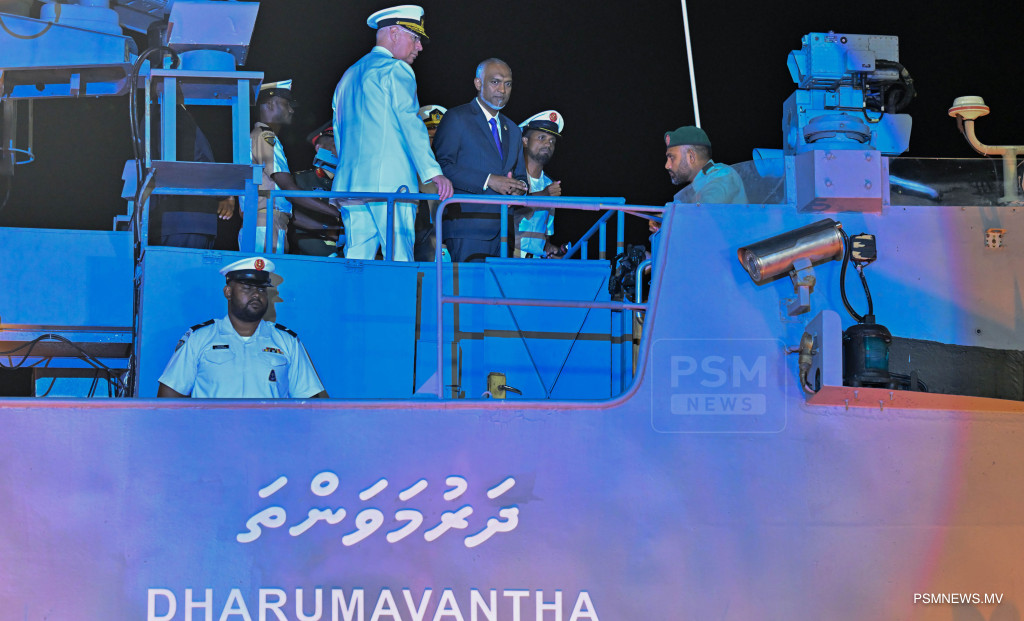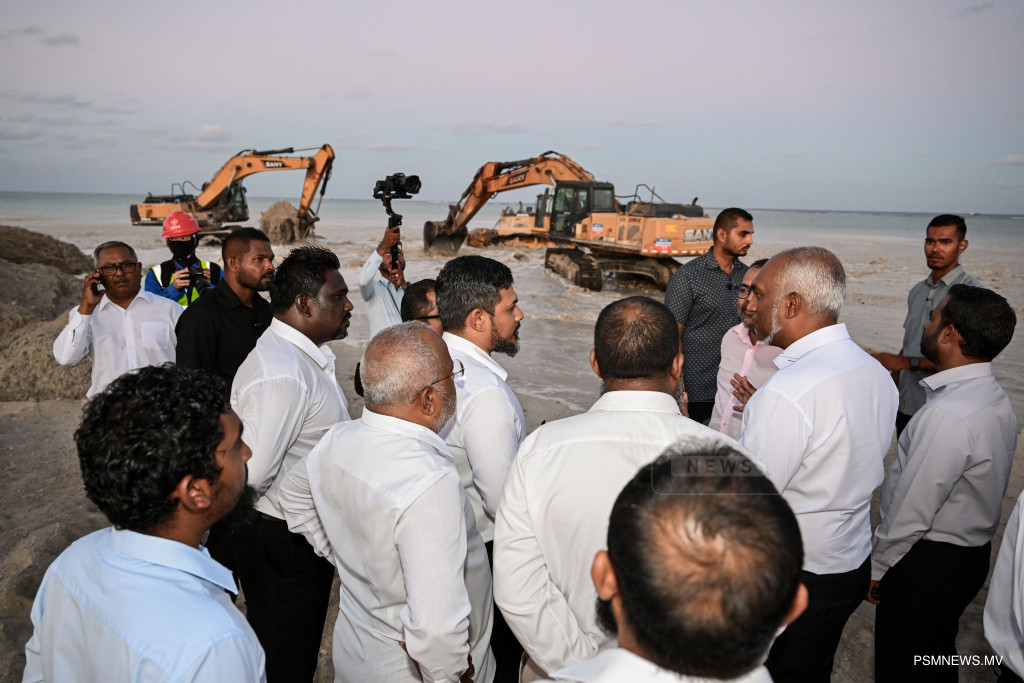Marking Two Years in Office, President Muizzu Advances Sovereignty, Economic Diversification, Housing Projects and Health Care Investment

Two years into his presidency, Dr Mohamed Muizzu has sought to redefine Maldivian governance around sovereignty, economic stabilisation, and structural reform. His administration argues that it has delivered decisive measures to confront debt, strengthen national defence, and advance long-term development.
President Muizzu assumed office on 17 November 2023, following a five-year period marked by instability, economic stagnation, and record debt accumulation without major development projects. At his inauguration, he pledged to protect Maldivian independence and integrity, declaring: “God willing, today marks the start of a special journey, the return of Maldivians to the Maldives after many years. This is the moment when the beloved pulse of our hearts beats with the commitment to fulfil the hopes and resolve the concerns of the Maldivian people.”
Sovereignty defined through the ‘Maldives First’ foreign policy
From the outset, the administration placed sovereignty at the centre of its agenda. The ‘Maldives First’ foreign policy was introduced to strengthen ties only with partners who respect the red line of Maldivian independence and integrity.
“The Maldivian government’s policy must be based on the utmost benefit to the Maldivian people. I am Maldivian. The Maldivian people come first on the list. People of other nations will follow after,” the president said, underscoring his hierarchy of national interest.
A campaign promise to remove foreign military personnel was fulfilled through diplomatic negotiations. In his 2024 Republic Day address, he stated: “Through diplomacy, conducted according to polite principles, all foreign troops stationed in this country have departed. Currently, there are no foreign military personnel stationed in this country. No uniform, nothing else. This is not a matter of difference or deception; it is a clear, straightforward truth.”
The policy has been acknowledged by neighbouring states, while the Maldives has cultivated ties with economically and militarily powerful nations. Internationally, the government points to an enhanced standing, citing its ban on Israeli passports and its criticism of the UN Security Council’s structure: “The Security Council must become more representative. Its composition is archaic and outdated. Out of touch with the realities of the UN membership today,” he said.

Building military strength and expanding public security
Attention then turned to national defence, which the administration regards as indispensable. Independence, it argues, requires a strong military equipped with modern tools and trained personnel.
“The work being done to strengthen the capacity of the military to reinforce and protect the independence of this nation is a national endeavour,” the president said. “Therefore, I say that I am working on this with pride. God willing, we will move forward with pride in bringing progress to all branches of the Maldivian military.”
Developments included surveillance drones, the creation of an MNDF Air Corps, a naval vessel from Turkey to double Coast Guard capacity, and armoured vehicles from the UAE.
Law enforcement was expanded in parallel, with police stations being established across inhabited islands since November 2023. Resources were directed at drug and gang-related issues, while a “National Service” programme was launched to instil national pride, Islamic values, and prepare school leavers for security and disaster response.

Confronting debt while diversifying the economy
The administration inherited debt of USD 7.72 billion, the largest in Maldivian history. “Today, as we assume control of the Maldivian state, the nation’s debt has reached a total of 119 billion Rufiyaa [approximately USD 7.72 billion]. This is the largest debt witnessed in Maldivian history across its entire financial life,” the president had said. “Nevertheless, God willing, we will take very decisive and rapid steps to overcome these challenges.”
Measures included halting debt monetisation, enacting a foreign currency law requiring resorts to convert part of their US dollar earnings into Maldivian Rufiyaa, and settling legacy debts, including USD 64.84 million owed to fishermen.
Diversification efforts introduced bunkering services, sea-to-air cargo operations, and special economic zones. A new foreign investment law replaced a half-century-old statute. Trade expansion was pursued through a free trade agreement with China, with negotiations ongoing with Turkey and India. The ‘Maldives 2.0’ digitisation project was launched to establish a ‘Digital-First Nation’.
Fisheries were prioritised with investments in ice plants, cold storage, and processing centres, alongside rules ensuring fishermen are paid within one week. “Because I believe that fishermen are such an important part of the nation, they have been given special priority in our government’s manifesto,” the president had said.
Tourism promotion was intensified through a partnership with Liverpool FC. “Since the UK is a country where many tourists come to the Maldives, and this also provides exposure to Europe and the rest of the world, Liverpool Football Club invited me to the match where the promotional advertisement began,” he had said. “This is, in fact, an important investment being made for Maldivian tourism and economy.”

Advancing infrastructure alongside human resource development
The administration’s philosophy rests on two pillars: infrastructural development and human resource development. “The safety of a state and the maintenance of its power, prestige, and respect in the world are built upon two main types of construction: infrastructural development and human resource development,” the president had said. “The policy of this presidential term will be to advance these two types of construction in a balanced manner… My government will proceed, God willing, upon these two foundations.”

Housing and decentralisation as a national priority
Addressing the housing crisis, long recognised as a root cause of social and health challenges, was a central pledge of the administration. The government has committed to providing housing for every citizen over the age of 18 by the end of its five‑year term.
The flagship initiative is the Rasmalé project, the country’s first eco‑city, which aims to deliver 15,000 plots and more than 26,000 flats, making it the largest housing project in Maldivian history. Other reclamation projects include Hulhumalé Phase III, Gulhifalhu, and Giraavarufalhu. In addition, the government launched the Hiyaavehi Financing Scheme, offering housing loans based on Islamic principles at 5 percent interest in collaboration with three banks.
Decentralisation has been advanced through a regional development vision. A 20‑year National Development Master Plan is being prepared, alongside the establishment of two Integrated Development Zones in the far north and south, and seven urban centres across seven regions of the Maldives. The president has prioritised consultation, visiting all 187 inhabited islands within the first two years, an unprecedented achievement. These visits led to the finalisation of passport and ID card issuance services, as well as the provision of ATM facilities across all atolls.

Expanding health care and specialised services
The health sector, previously regarded as inadequate, has received significant investment. Within the first 100 days, an air ambulance service using Dash 8 aircraft was introduced. Price controls were imposed on 250 medicines, and a bulk procurement system was established to ensure the highest quality supplies.
The Aasandha health insurance scheme was expanded to cover treatment in Thailand and the UAE. Advances in specialised care included strengthening thalassaemia services, initiating free bone marrow transplants, sending at least 10 children abroad annually, and commencing construction of a state‑of‑the‑art thalassaemia hospital.
Further initiatives included the launch of the 24‑hour National Mental Health Helpline (1677), the establishment of a National Fertility Centre, and clinics dedicated to endometriosis and PCOS. The Aasandha scheme was broadened to cover treatments for PCOS, endometriosis, IUI, and IVF. To sustain these services, a Fertility Care Fund of USD 973,709 was created.
Capacity expansion has also been highlighted. The government asserts it has added 194 hospital beds to the main hospital in the last two years, compared with the 130 beds added over the previous three decades.

Safeguarding youth and reinforcing national identity
Safeguarding the rising generation has been another priority. To curb illicit activities, the government imposed a nationwide ban on vapes, citing concerns about drug‑infused products fuelling addiction among youth. High tobacco taxes were introduced to fund free cessation clinics, while a generational ban on tobacco use was implemented on 1 November, making the Maldives one of the first countries globally to enact such a measure.
The administration also placed emphasis on national identity and religious values. “I want religious affection to increase in the hearts of the youth. I am eager to see the emerging generations become people of noble character who respect the sacred religion of Islam. Therefore, we will work to increase the love for the sacred religion of Islam in the hearts of Maldivians,” the president said earlier.
Initiatives included incorporating national identity into the educational curriculum, establishing a National Heritage College, and accelerating the digital cataloguing of cultural heritage.
